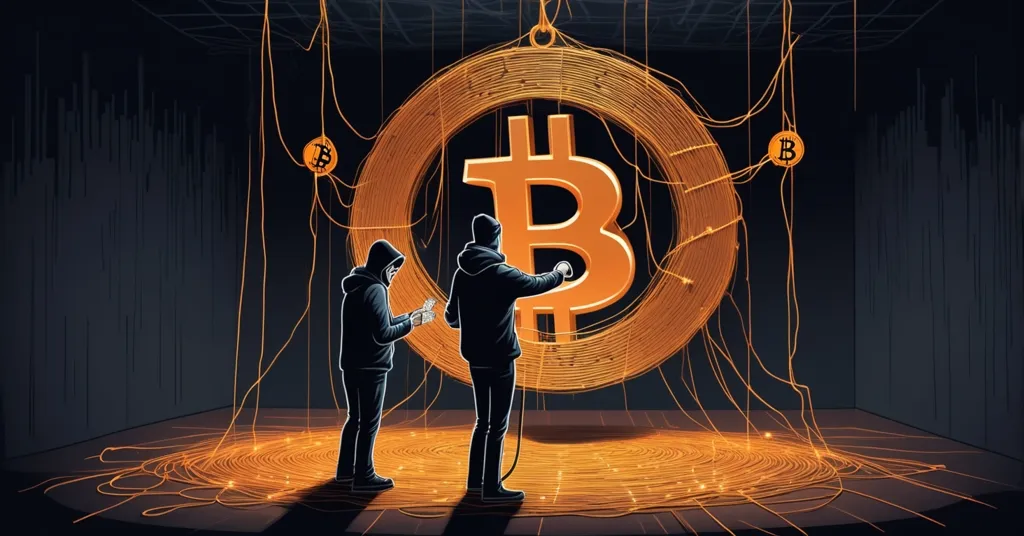Alabama Man Gets 14 Months for SEC X Hack, Causing Bitcoin Price Chaos

Alabama Man Sentenced for SEC X Hack: The Impact on Bitcoin Price and Market Manipulation
Eric Council Jr., a 26-year-old from Huntsville, Alabama, has been sentenced to 14 months in prison for orchestrating a SIM-swap attack that compromised the SEC’s official X account. This attack led to a false announcement about the approval of spot Bitcoin ETFs, causing Bitcoin’s price to surge and then crash due to misinformation.
- Eric Council Jr. sentenced to 14 months for SEC X hack
- SIM-swap attack led to false Bitcoin ETF approval announcement
- Bitcoin price spiked then crashed due to misinformation
In January 2024, Council executed a SIM-swap attack, a method where a hacker tricks a telecom provider into moving a victim’s phone number to a new SIM card under their control. This allowed him to access the SEC’s X account and post a false statement claiming that spot Bitcoin ETFs had been approved. The announcement sent Bitcoin’s price soaring by over $1,000, reaching nearly $48,000, only to plummet more than $2,000 once the truth emerged, resulting in approximately $220 million being liquidated from the market.
Spot Bitcoin ETFs are investment funds that track Bitcoin’s price, allowing investors to gain exposure to the cryptocurrency without owning it directly. Contrary to the false claim, these ETFs were not approved until weeks later on January 10, 2024. Council, who was compensated in Bitcoin for his role in the scheme, was sentenced on May 16, 2025, by Judge Amy Berman Jackson in the U.S. District Court for the District of Columbia. In addition to his prison term, he faces three years of supervised release and was ordered to forfeit $50,000 earned through similar attacks.
The ramifications of this attack extend beyond immediate market manipulation. As Acting FBI Assistant Director Darren Cox stated:
The breach was a calculated act aimed at eroding public trust and exploiting the financial system through misinformation.
This incident underscores the fragility of our official channels and the susceptibility of financial markets to misinformation. It also brings to light the broader issue of cybersecurity in the financial sector, especially as cryptocurrencies continue to gain mainstream traction. The case serves as a stark reminder of the potential for cybercriminals to exploit these vulnerabilities for profit.
The approval of spot Bitcoin ETFs represents a significant milestone for Bitcoin and the broader crypto market, providing a regulated avenue for investors to gain exposure to the cryptocurrency. However, as this incident demonstrates, the path to mainstream adoption is fraught with challenges, including market manipulation and security breaches. While Bitcoin maximalists might see this as a bump on the road to widespread acceptance, the incident also highlights the importance of robust security measures and vigilance against scams and fraud.
In the world of decentralized finance, where the ethos of freedom and disruption reigns, events like these serve as a call to action. They remind us that while the potential for Bitcoin and other cryptocurrencies to revolutionize finance is immense, the journey is not without its risks. As we champion effective accelerationism and the transformative power of blockchain technology, we must also confront the dark side of this revolution, ensuring that the path forward is paved with integrity and security.
This case exemplifies the challenges of market manipulation, particularly through pump-and-dump schemes where false information creates artificial demand and price spikes, exploiting investor emotions like FOMO (fear of missing out). It’s a reminder that while Bitcoin and other cryptocurrencies hold the promise of disrupting traditional finance, they are not immune to the same old tricks of the trade.
While some might argue that such incidents are merely temporary setbacks and do not detract from Bitcoin’s long-term potential, it’s crucial to acknowledge the vulnerabilities in our digital infrastructure. The incident underscores the need for telecom companies to implement stronger security measures, such as two-factor authentication, to prevent similar SIM-swap attacks. Moreover, it highlights the importance of regulatory oversight in protecting investors and maintaining market integrity.
As we move forward, it’s essential to balance our optimism about the future of Bitcoin and blockchain technology with a realistic view of the challenges we face. From scams and market manipulation to cybersecurity threats, the path to a decentralized future is complex. Yet, it’s this very complexity that drives innovation and pushes us towards a more open, secure, and equitable financial system.
Key Takeaways
What was the method used to hack the SEC’s X account?
A SIM-swap attack was used, where the hacker deceives a telecom provider into moving the victim’s phone number to a new SIM card under their control.
How did the false announcement affect Bitcoin’s price?
The false announcement caused Bitcoin’s price to spike by over $1,000 before dropping more than $2,000 once confirmed as fake.
What was the real status of spot Bitcoin ETFs at the time of the hack?
At the time of the hack, spot Bitcoin ETFs had not yet been approved; the actual approval came weeks later.
What were the consequences faced by Eric Council Jr.?
Eric Council Jr. was sentenced to 14 months in prison and will face three years of supervised release.
Why is this case significant for the cryptocurrency market?
This case highlights the vulnerability of official channels to cyberattacks and the market’s sensitivity to misinformation, particularly concerning significant regulatory announcements like the approval of spot Bitcoin ETFs.



